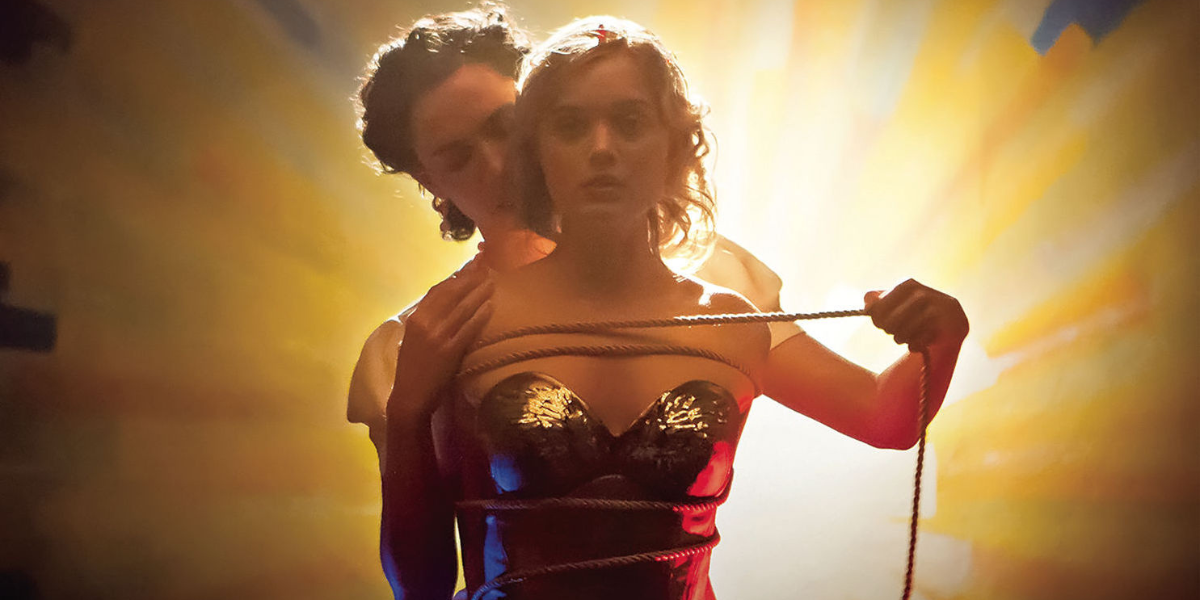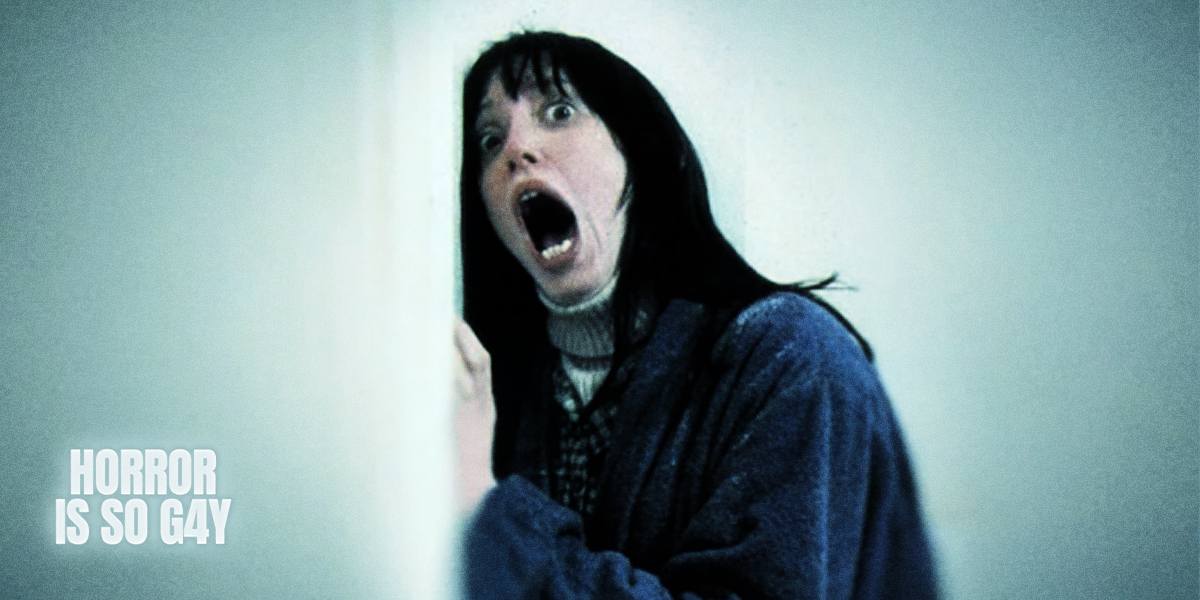Welcome to Anatomy of a Queer Sex Scene, a series by Drew Burnett Gregory and Kayla Kumari Upadhyaya about queer sex scenes in film. This week, Kayla writes about Angela Robinson’s Professor Marston and the Wonder Women.
When Drew and I created this series, it was not with the intention of ranking queer sex scenes from film or celebrating the “best.” It was to excavate sex scenes that mean something to us, to study the ways desire, sex, power, kink, and the erotic sit inside these stories and what meaning we can make of sex scenes. In that way, I suppose, we’re not unlike the characters at the heart of Professor Marston and the Wonder Women, characters who are obsessed with the idea that sex, seduction, and power exchange are the ultimate controlling forces of the world and can be used to understand everything from biology to war. Written and directed by queer filmmaker Angela Robinson, the film’s queer sex scenes are like kaleidoscopes of desire.
Professor Marston and the Wonder Women is based on the real lives of William Moulton Marston (Luke Evans), a psychologist and the inventor of the Wonder Woman character, and his wife Elizabeth (Rebecca Hall) and their shared lover Olive (Bella Heathcote). Before she becomes their partner, Olive starts as William’s student and quickly captivates both him and Elizabeth, who are together working to create a lie detector machine. Even more than their pursuit of truth, Elizabeth and William are constantly chasing down what it is they really want and what it is they love, their sexual cravings at odds with the temperance and strict morality codes of the 1920s and, later, the 40s when the three lovers live together and try to make their unconventional arrangement work in a hostile world. More so than a film about creating Wonder Woman, it’s a film about creating queer family. And the backdrop of its comic book culture wars is disturbingly relevant to today’s world.

I could write at length about the way the film portrays queer family-making and how to make a life and art from the margins, but today we’re here to talk about sex. Sex courses through Professor Marston and the Wonder Women, and before William, Elizabeth, and Olive ever have sex with each other, we’re treated to arguably the film’s kinkiest scene, one that occurs long before the three learn about the pleasures of bondage. William and Elizabeth convince Olive to let them spy on one of her sorority’s rituals, a pledging event where new pledges are forced to dress like babies and be disciplined by their big “sisters.” William and Elizabeth watch through a barred banister from upstairs while Olive spanks a pledge with a paddle for talking back. The scene is slow, aching. There’s a wild confluence of pleasures and performances at play. Elizabeth watches with clear interest, and when Olive notices this, her lackluster paddling becomes firmer, more deliberate. William sees Elizabeth’s pleasure, too, and leans into it, reaches under her skirt. Before she can climax, Elizabeth tells William to stop.

Elizabeth’s shame is a fascinating aspect of the film. Despite being a generally ambitious, confident, and brash woman, she’s the most hesitant of the three when it comes to carnal desire. It’s Olive who makes the first move with Elizabeth, and it’s Olive and William who convince her of the paradoxical freedoms of bondage. Hall and Evans give devastatingly charming performances, and Hall especially is adept at harnessing the many contradictions and contrasts of the film’s world and storytelling. Elizabeth is far from prude, but fear punctures her desires. In so many ways she knows exactly what she wants, but in others, her self-knowledge is upended by the arrival of Olive. There are always new discoveries to be made.
Indeed, the Marstons approach sex with the same intensity and curiosity as their scientific research. A little under an hour into the film, the three finally act on their simmering tension with each other. In what is easily the most deserved needledrop of the song “Feeling Good,” a three way kiss slinks into a sexy montage of the three fucking in the backstage area of a campus theater. They use costumes and props to roleplay, bind each other, slip into a fantasy space with each other. Robinson’s direction is gorgeous, coalescing their intersecting and vertiginous appetites for each other into something immersive and artful.

Later in the film, William wanders into a sex shop whose proprietor operates an underground bondage group in the back room. By now, William, Olive, and Elizabeth are living together with several children, spinning a lie about Olive’s husband dying and the Marstons taking her in and sacrificing other parts of their lives (William and Elizabeth lose their academic jobs as a result of their relationship with Olive, so William takes up writing self-help books and Elizabeth becomes a secretary). William realizes pornographic images depicting BDSM encapsulate his life’s work in psychology succinctly. Sex is everything and everywhere. When he creates Wonder Woman and steeps his comics in images that blur pain/pleasure, it’s like his — and Elizabeth’s and Olive’s — life work has finally clicked into place. He uses sex, uses shame even, to disseminate messages of queerness, empowerment, and women’s liberation. He’s not doing it because sex sells; he’s doing it because he knows sex is a powerful driving force behind human connection. He wants to challenge the idea of normal, because his entire life is a confrontation of normal. Sex becomes a tool for that confrontation.

Olive, Elizabeth, and William never lose their appetites for one another. Their cravings shift and evolve, Olive coming into herself as a submissive, Elizabeth and William enjoying dominance but also often switching between roles in the bedroom. Professor Marston doesn’t intellectualize sex, but it does turn sex into a site of psychological discovery. After one neighbor sees them having sex, another calls them freaks. And of course, in his mouth, it’s a damnation, an attempt to wound. But they are freaks. They’re horny, nerdy, queer freaks who don’t fit in their professional or public worlds. William has to create an entire comic strip and character to make a world for people like them. And every time they have sex together, Olive, Elizabeth, and William are creating something together. Their fucking becomes world-making. Their love and desire for each other doesn’t merely imagine new possibilities; they’re creating those possibilities.








Comments
I love this movie and am glad it’s getting some recognition! One of my favorite pieces of polyam representation.
I saw 3 times in the theater, and was the first Blu-Ray I ever purchased. 😍
Love this movie, Liked the article too but I prefer when these are more of a conversation between Kayla and Drew.